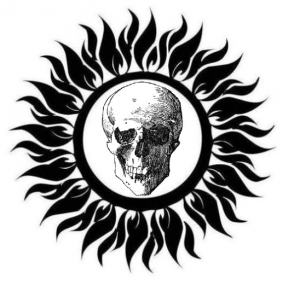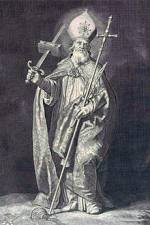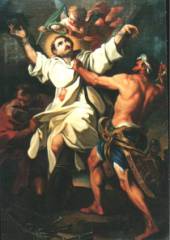The Holy Inquisition
“Light Conquers All” - Inquisitor Errant Theodora Beringar, commenting on the burning of the Staffordshire Warlocks.
The Inquisition is a Catholic religious order that has been banned by the Pope. It is composed of the most zealous of the faithful, Christians who will brook no compromise with unholy forces; be they Fey or Pagan. It is their doctrine that the Fey are agents of corruption that has put them in direct contention with papal edict. Whilst the majority of the Church condemn them for their actions, some yet respect them for their faith and defence of Christendom against heresy and black magic. But all fear them, for though their order are scattered and secretive, they have ears and eyes throughout the church – and the only mercy meted out by their followers is that of a swift death.
History
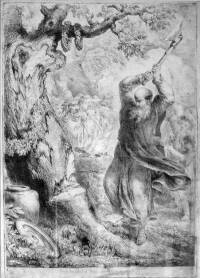 The Inquisition's furthest predecessors were the Knightly orders of early Christendom. Existing on the edges of “civilised” territory these men and women sought to expunge worship of the Old Gods from within converted countries; and often raided into Pagan lands to bring down temples or carve idols to kindling.
The Inquisition's furthest predecessors were the Knightly orders of early Christendom. Existing on the edges of “civilised” territory these men and women sought to expunge worship of the Old Gods from within converted countries; and often raided into Pagan lands to bring down temples or carve idols to kindling.
But it was the conflict between the Seelie and Charlemagne that forged them into one organisation, uniting scattered warriors and priests together with the goal of pushing the demons back to the hell they came from. At the Council of Venice the representatives of these forces came together, forming the Holy Inquisition and pledging their service to it. They would prove instrumental in Charlemagne’s victory (indeed there are some rumours that they first forged Cold Iron). But no sooner had the war been won than they were betrayed. With the contract signed Charlemagne had no desire for a powerful militant organisation in his midst, especially one that regarded the signing of the Pact as heresy and its authors heretics. He forcibly disbanded the Inquisition, imprisoning the then High Inquisitor and giving his followers an ultimatum – lay down their weapons or be hung as rebels. An even greater blow came with the Pope's decree that the Fey possessed souls, and so were to be treated as beings of God and accepted into the church.
But the Inquisition, bitter and battered though it was, would not die so easily. Many kept their arms and armour, staying beyond the laws of men to follow the laws of God, continuing their battle against Pagans and Fey until the present. Others blended back into the Church hierarchy, ever seeking to rise through the ranks and restore the Purity of the Church from the false Popes who have soiled it.
Picture Left: Saint Boniface chops down Thor's Oak
Organisation, Beliefs and Purpose
The Inquisition is formed into two branches. The Inquisition Errant are those who travel Christendom (and beyond) seeking to hunt down the Fey, and burn the temples of Old Gods to ashes. The Inquisition Interior is a secret brotherhood within the Church itself, comprised of those who believe that the Fey and Old Gods are best fought through influencing the Church’s teachings and actions. Both arms of the Inquisition seek to root out and eliminate all non-Christian magic. They regard the Fey demons; and the war between the Fey and Charlemagne as an attempt by the Forces of Hell itself to bring about the end of Christendom. This attempt has pre-empted, and therefore voided, the prophecies of the Book of Revelation. Thus the manner of the final battle between Light and Darkness has become uncertain, and the Inquisition has inherited a duty of eternal vigilance.
For the Inquisition, threats within the church are as important as those without. Although Charlemagne may have initially seen the Fey for what they were, he was tempted to make a the treaty with Fey; in exchange being granted their service in the earthly realm, and a seat at the right hand of the greatest Fey in the depths of their nightmarish kingdoms.
The Inquisition also believe that the line of Petrine succession was extinguished when Pope Lucia betrayed the church and issued Nymphae Animas, the papal bull declaring that the fey have souls and were to be treated as if Christians. The Inquisition maintain their own rival Pope, but they know that they cannot gain the legitimacy of Papal infallibility without control of the Petrine Throne in the Vatican itself.
The organisation of the order is decentralised and, thanks to the grave sanctions facing a discovered Inquisitor, incredibly secretive. A member of the order rarely knows the identity of more than one of his fellows; communication is conducted by unwitting intermediaries and coded missives; and most Inquisitors would rather die than reveal others. It is even rumoured that the Inquisition's secrecy is such that it must be a miracle, worked through one of their Patron Saints.
Perception of the Order
Although little is done to reign in the excesses of the Inquisition Errant (why waste resources bringing down valuable allies against the Old Gods?), the Inquisition Interior is regarded as a grave and insidious threat by the leaders of the Church. The fear of the brotherhood manipulating the Church into starting another ruinous conflict with the Fey (or seizing internal control from ordinary ordained) is rife; and their refusal to accept Papal doctrine on the Fey is excuse enough to brand them heretics. If an Inquisitor Interior is revealed he can expect banishment and excommunication at the very least; torture and execution at the worst.
At the lower levels of the Church and amongst the rural population, sentiment towards the Inquisition is more positive. Many priests secretly (or not so secretly) doubt the wisdom and scriptural justification for the treaty with the Fey, whilst others long for a harsher stance against the Old Gods. Likewise there are those, especially in isolated settlements - plagued by rumours of magic and sacrifice - who would sleep easier knowing an Inquisitor Errant was around their shire.
Ranks
Inquisition Interior
Papa In Exilio:
The leader of the Inquisition itself, appointed by a conclave of High Inquisitors upon his predecessors death. Knowledge about the nature and identity of such a figure is almost non-existent within the Inquisition itself, much less outside of it.
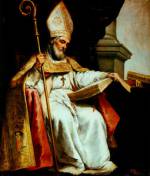 High Inquisitor:
High Inquisitor:
In every Christian country where the Inquisition has influence there is a high inquisitor, who tends to fill a lofty position within that countries Church. These individuals wield control over all Inquisitors (both Errant and Interior) within their country and correspond (by proxy and coded message) with other High Inquisitors across Europe in order to coordinate their actions. Upon their death the position is passed on to a previously selected successor.
Inquisitor Interior:
Requires at least Rank(+1) quirk.
A member of the Inquisition initiated into its major doctrines, these are trusted and capable members of the order within the Church. They have various degrees of responsibility and power within the order, but (thanks to the orders pervasive secrecy) usually know only fragments of its organisation.
Acolyte Interior:
A trainee Inquisitor, they are usually selected for closer inspection (then recruitment) on behalf of their fervour, bravery and cunning. They are contacted anonymously at first, only being made aware of the Inquisitor Interior who has recruited them after they have successfully performed a number of tasks for the order and thus proven their loyalty.
Inquisition Errant
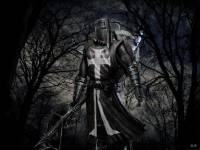 Inquisitor Errant:
Inquisitor Errant:
Requires at least Rank(+1) quirk.
A member of the knightly arm of the Inquisition, these travellers are both preacher and holy warrior, stirring up the populace against the Fey and Old Gods, then confronting these threats in combat when they can. Theoretically every Inquisitor Exterior obeys an Inquisitor Interior; and through them a High Inquisitor. In practise many operate as lone wolves, whilst others contact the Inquisition Interior rarely and irregularly. The position of Inquisitor Errant is most often inherited by the Inquisitors eldest Acolyte. However an Inquisitor Errant may bequeath his title upon any of his Acolytes should he deem them worthy.
Acolyte Errant:
For a young boy rescued from sacrifice by a knight upon a black charger; or a women who sees a “demon” driven back by cold iron, the position of Acolyte can seem an enticing one. The reality; of sharpening their masters sword, catching their masters dinner, grooming their masters horse, is often less amenable to storytelling. Nevertheless there are many who volunteer and persist with Inquisitorial training, and it is rare for an Inquisitor Errant to be seen without at least one Acolyte beside him.
Chapter Keeper:
Inquisitors are men and women of rare fortitude. But swords break, provisions run low and battles are lost. When their supplies are exhausted and enemies are on their tail, an Inquisitor Errant seeks the safety of one of the many chapter houses dotted across the British Isles. Funded by diverted gold from the Inquisition Interior and maintained by a loyal Chapter Keeper, these act as both sanctuary and armoury for the Inquisitor down on his luck. Often Chapter houses contain smithies, enabling the Chapter keeper to arm the Inquisitor and shoe his horse, whilst providing a good cover from investigators.
Worship
The Inquisition are often devoted to either Saint Boniface, Scourge of Heretics, who assists them in their work fairly directly or Saint Nonnata Keeper of Secrets, who is able to ensure their plans are not compromised by wrong-doers and nay-sayers.
It is said by those who seek to suppress the Inquisition that the rites of they practice in the name of Boniface are no better than the worst excesses of Pagan worship as they dance in the blood of the impure. Whilst such propaganda is unlikely to be accurate, one must wonder if there is a degree of truth in there somewhere.
Meanwhile, the occasional discovery of the secret shrines of Saint Nonnata, where none should be, lend credence to rumours of how widespread the Inquisition Interior are within the church.
Faction Specific Quirks
Cold Iron Armoury (+2):Cold Iron, formed from fallen stars and arcane alchemy, is valuable beyond measure in the fight against the fey. To have such weapons is to be amongst the greatest of the Inquisitions warriors, or to have a patron or relative who fit such a description. You may choose one such tool from the following list.
- A cold iron blade (axe, sword, etc.).
- A crossbow complete with cold iron quarrels.
- A length of cold iron chain and manacles.
- A set of small glass flasks whose interior is filled with cold iron filings.
- A shield with a spiked cold iron boss.
- A set of cold iron throwing knives.
Tainted by Heresy (-1/-2): There is nothing the Inquisition despises more than a traitor amongst its own ranks, a once pure man tainted by heresy or false worship. At some point in your past you have engaged in such practises, either with the Old Gods or the Fey. At level one this heresy is yet unsuspected. At level two one of your superiors suspects your purity and watches you closely for any hint of transgression or proof. OOC: This quirk can be earned during play by those Inquisitors who dabble in forbidden arts.
